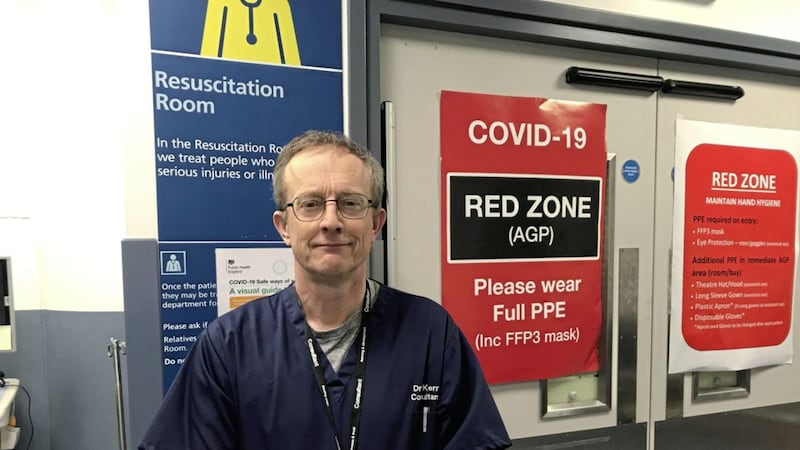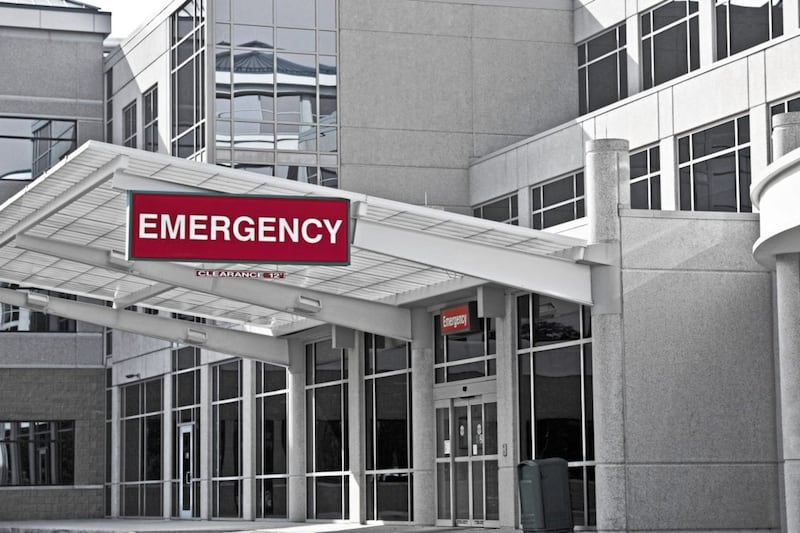VULNERABLE patients attending A&E with multiple injuries and life-threatening illnesses are at risk of serious harm - and in some cases death - from escalating delays, a consultant has warned.
Dr Paul Kerr, vice-president of the Royal College of Emergency Medicine (RCEM) for Northern Ireland, said staff were facing "impossible challenges" by caring for more than 100 people in small areas - with safety becoming a major concern.
The medic is based at the Royal Victoria Hospital in Belfast and called for an emergency admission recovery plan to sit alongside current government strategies to tackle waiting lists.
His concerns come just days after an elderly woman died after spending eight hours in an ambulance queued outside a busy A&E department in Dundonald.
And just a fortnight ago, it emerged an A&E patient waited a record high six days for admission to a bed at the crisis-hit Antrim Area Hospital, which had declared a 'potential major incident' due to medics' fears they could not provide safe care.
Dr Kerr highlighted research carried out by the RCEM on the consequences of lengthy waiting times in emergency settings - with delays of more than five hours before hospital admission linked to increased mortality from any cause in the 30 days that followed.
Patients who waited eight to 12 hours had a 10 per cent higher likelihood of death.
"We believe there is harm associated with this and the College has recently released evidence to show increased death associated with increased waits," he said.
"This isn’t a big surprise as it’s very difficult to get quite the same standard of care when patients are in a very crowded area.
"We try to do the best for patients coming in through the door but our staff are dealing with impossible challenges of 100 to 120 patients in a small area – it’s difficult to look after them safely."
Since last July, the north's A&E departments have been firefighting due to severe workforce shortages (particularly among nurses) and Covid pressures.
While coronavirus admissions have plummeted and positive patients requiring hospitalisation are not as sick, the number of NHS staff quitting their jobs during the pandemic has been devastating for the speciality.
Dr Kerr said many colleagues had gone to work for the private sector.
"Morale is taking a bit of a hit as the situation is not getting better," he added.
"The main problem in the hospitals at the moment is that the patients can’t get access to beds. These are the most vulnerable patients with the emergency conditions and indeed some of them are surgical who have multiple injuries.
"There’s also all the usual things like heart attacks and strokes and the most serious infections.
"We’ve known for a long time we’ve an ageing population and we’re going to need more capacity – in other words, access to beds for these patients.
"The situation at the moment is very unfortunate as we also have great difficulty discharging the medically fit patients from hospital.
"We also have large numbers of staff absent due to Covid, though the good thing is people aren't as sick with Omicon. But the situation is so poor on the ground that we are losing staff. We are losing them to agency, to the private sector. Some services haven’t really rebooted or reopened after Covid."
With one in four of the population now on a waiting list, an increasing number of cancer patients are receiving delayed diagnosis in A&E settings - a situation Dr Kerr described as "very distressing":
"People getting a diagnosis of cancer in emergency departments is something we have seen for years but something that is continuing to increase due to the very long waiting lists. People aren’t being seen in the outpatient clinics by the specialist.
"The result is they end up presenting as an emergency and getting terrible news in a busy department."
A government review of urgent and emergency care in Northern Ireland began three years ago and recommended an entire overhaul of the system - similar to multiple reform papers dating back more than 20 years which were never properly implemented.
The document is due to go out to public consultation but a blueprint leaked in July 2020 revealed plans centring on the north's five biggest A&E departments no longer accepting walk-ins.
Other proposals, such as a 'phone first' system and the creation of urgent care centres have already been introduced.
With the collapse of the Stormont executive and an election two months away, it is unclear as to when the review - containing many politically unpalatable recommendations - will be released.
Dr Kerr said he was aware that changes couldn't happen overnight but action was needed soon across all settings from GP to acute care.
He also raised concerns about the reluctance in general practice to revert back to face-to-face appointments after a British Medical Association doctor doctor told The Irish News it was "highly likely" that telephone triage of patients would continue.
"General Practice announcing they’re not going to go back to face-to-face is not a good move for us at this time for us. That has not helped," Dr Kerr added.
"Usually, big service changes like that are put out to public consultation.
"We have lobbied government about the crisis in ED and there is a genuine response from ministers but politically they’re more worried about waiting lists ,which is not a new problem.
"If you look at one thing without looking at another in the health service, or focussing on another, you cause one part to get worse if you ignore it."








